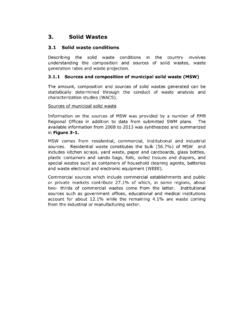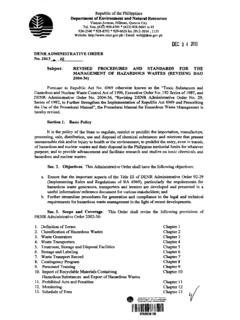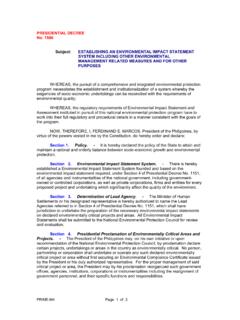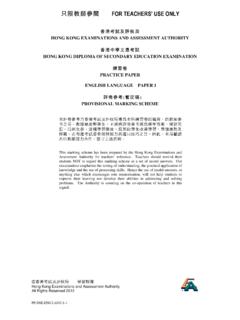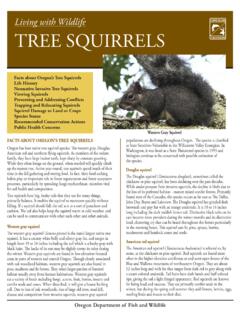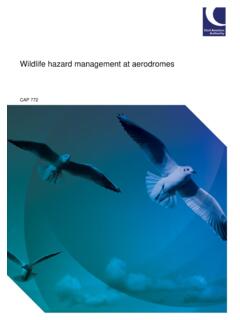Transcription of REPUBLIC ACT 9275 AN ACT PROVIDING FOR A …
1 1 REPUBLIC OF THE PHILIPPINES CONGRESS OF THE PHILIPPINES Metro Manila TWELFTH CONGRESS OF THE REPUBLIC ) OF THE PHILIPPINES ) Third Regular Session ) REPUBLIC ACT 9275 AN ACT PROVIDING FOR A COMPREHENSIVE WATER QUALITY MANAGEMENT AND FOR OTHER PURPOSES Be it enacted by the Senate and the House of Representatives of the Philippines in Congress assembled: CHAPTER 1 GENERAL PROVISIONS Article 1 Declaration of Principles and Policies SECTION 1. Short Title. - This Act shall be known as the Philippine Clean Water Act of 2004.
2 SEC. 2. Declaration of Policy. - The State shall pursue a policy of economic growth in a manner consistent with the protection, preservation and revival of the quality of our fresh, brackish and marine waters. To achieve this end, the framework for sustainable development shall be pursued. As such, it shall be the policy of the State: a) To streamline processes and procedures in the prevention, control and abatement of pollution of the country s water resources; b) To promote environmental strategies, use of appropriate economic instruments and of control mechanisms for the protection of water resources.
3 C) To formulate a holistic national program of water quality management that recognizes that water quality management issues cannot be separated from concerns about water sources and ecological protection, water supply, public health and quality of life; d) To formulate an integrated water quality management framework through proper delegation and effective coordination of functions and activities; e) To promote commercial and industrial processes and products that are environment friendly and energy efficient; f) To encourage cooperation and self-regulation among citizens and industries through the application of incentives and market-based instruments and to promote the role of private industrial enterprises in shaping its regulatory profile within the acceptable boundaries of public health and environment.
4 G) To provide for a comprehensive management program for water pollution focusing on pollution prevention; h) To promote public information and education and to encourage the participation of an informed and active public in water quality management and monitoring; i) To formulate and enforce a system of accountability for short and long-term adverse environmental impact of a project, program or activity; and 2 j) To encourage civil society and other sectors, particularly labor, the academe and business undertaking environment-related activities in their efforts to organize, educate and motivate the people in addressing pertinent environmental issues and problems at the local and national levels.
5 SEC. 3. Coverage of the Act. This Act shall apply to water quality management in all water bodies: Provided, That it shall primarily apply to the abatement and control of pollution from land based sources: Provided, further, That the water quality standards and regulations and the civil liability and penal provisions under this Act shall be enforced irrespective of sources of pollution. Article 2 Definition of Terms SEC. 4. Definition of Terms. - As used in this Act: a) Aquifer - means a layer of water-bearing rock located underground that transmits water in sufficient quantity to supply pumping wells or natural springs.
6 B) Aquatic life - means all organisms living in freshwater, brackish and marine environments. c) Beneficial use - means the use of the environment or any element or segment thereof conducive to public or private welfare, safety and health; and shall include, but not be limited to, the use of water for domestic, municipal, irrigation, power generation, fisheries, livestock raising, industrial, recreational and other purposes. 1. Use of water for domestic purposes - means the utilization of water for drinking, washing, bathing, cooking or other household needs, home gardens and watering of lawns or domestic animals; 2.
7 Use of water for municipal purposes - means the utilization of water for supplying water requirements of the community; 3. Use of water for irrigation - means the utilization of water for producing agricultural crops; 4. Use of water for power generation - means the utilization of water for producing electrical or mechanical power; 5. Use of water for fisheries - means the utilization of water for the propagation of culture of fish as a commercial enterprise; 6. Use of water for livestock raising - means the utilization of water for large herds or flocks of animals raised as a commercial enterprise; 7.
8 Use of water for industrial purposes - means the utilization of water in factories, industrial plants and mines, including the use of water as an ingredient of a finished product; and 8. Use of water for recreational purposes - means the utilization of water for swimming pools, bath houses, boating, water skiing, golf courses and other similar facilities in resorts and other places of recreation. d) Classification/Reclassification of Philippine Waters means the categorization of all water bodies taking into account, among others, the following: (1) existing quality of the body of water; (2) size, depth, surface area covered, volume, direction, rate of flow and gradient of stream.
9 (3) most beneficial existing and future use of said bodies of water and lands bordering them, such as for residential, agricultural, aquacultural, commercial, industrial, navigational, recreational, wildlife conservation and aesthetic purposes; and (4) vulnerability of surface and groundwater to contamination from pollutive and hazardous wastes, agricultural chemicals and underground storage tanks of petroleum products. e) Civil Society - means non-government organizations (NGOs) and people s organizations (POs). f) Cleaner production - means the application of an integrated, preventive environmental strategy to processes, products, services to increase efficiency and reduce risks to humans and the environment; g) Clean-up operations - means activities involving the removal of pollutants discharged or spilled into a water body and its surrounding areas, and the restoration of the affected areas to their former physical, chemical and biological state or conditions.
10 3h) Contamination - means the introduction of substances not found in the natural composition of water that make the water less desirable or unfit for intended use. i) Department - means the Department of Environment and Natural Resources. j) Discharge includes, but is not limited to, the act of spilling, leaking, pumping, pouring, emitting, emptying, releasing or dumping of any material into a water body oronto land from which it might flow or drain into said water. k) Drinking water - means water intended for human consumption or for use in food preparation.



